What is Benzo Detox?
A benzodiazepine, or benzo, is a class of drugs used to treat various conditions. Conditions commonly treated with benzos include insomnia, anxiety, sleep disorders, and even alcohol withdrawal. In addition, these substances act on the GABA receptors in the brain as they produce a very calming effect. Unfortunately, dependence can develop in as little as a month. High-risk patients or those with unstable medical conditions or a significant seizure history may benefit from admission to an inpatient service for benzo detox or withdrawal. [1]
***Gamma-aminobutyric acid or GABA is a naturally occurring amino acid that works as a neurotransmitter in your brain.***
Benzodiazepine Withdrawal
The benzo withdrawal symptoms will differ depending on how the detox process is administered. For instance, in a professional detox center where the client is weaned off properly, symptoms include feeling sleepy, depressed, sweating and chills. [2]
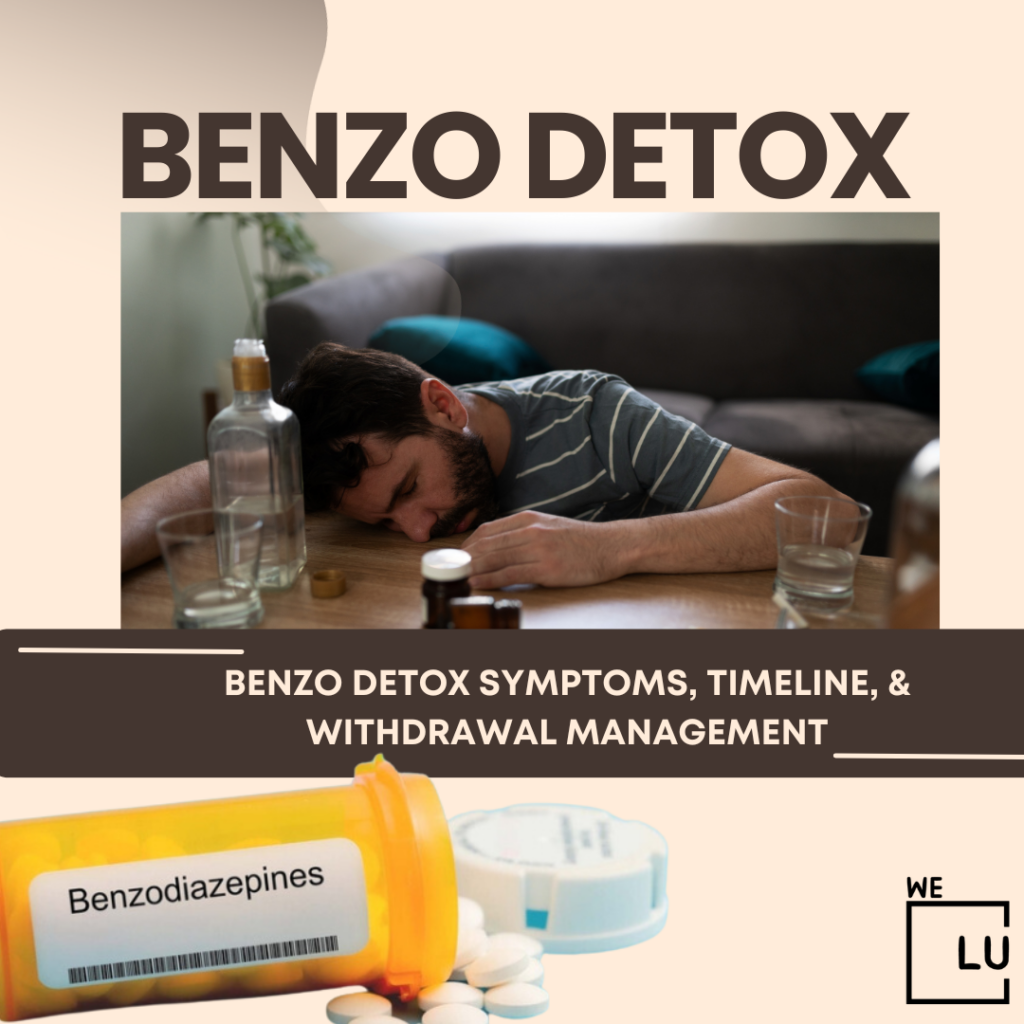
Symptoms Of Withdrawal
Benzodiazepine withdrawal becomes much more severe and fatal, most especially without medical supervision. In addition, you may develop Benzodiazepine Withdrawal Syndrome that could cause more painful effects to your body and mind.
General
- Headache
- Palpitations
- Sweating
- Tremor
- Muscle pain, stiffness, and aches (limbs, back, neck, jaw)
Neurological
- Dizziness
- Paraesthesia or shooting pains in neck and spine
- Visual disturbances (blurred vision, diplopia, photophobia, image lags behind eye movements)
- Tinnitus
- Faintness and dizziness, sense of instability
- Confusion, disorientation (may be intermittent): A common cause of disorder in older patients
- Delirium (in the absence of autonomic hyperactivity): Particularly in older patients
- Delusions, paranoia
- Hallucinations (visual, auditory)
- Grand mal seizures 1–12 days after discontinuing benzodiazepines
Gastrointestinal
- Nausea
- Anorexia
- Diarrhea (may resemble irritable bowel syndrome)
Psychological
- Rebound insomnia, nightmares
- Anxiety, panic attacks
- Irritability, restlessness, agitation
- Poor memory and concentration
- Perceptual distortions – sensory hypersensitivity (light, sound, touch, taste), abnormal sensations (e.g., ‘cotton wool’ sensations)
- Metallic taste
- Distortions of body image
- Feelings of unreality, depersonalization, derealization
- Depression, dysphoriac
Benzo Detox & Benzodiazepine Withdrawal Timeline
Much like detoxing from other prescription drugs, benzo withdrawal timelines can differ from case to case. For someone using short-acting benzos, withdrawal symptoms may begin to present themselves in as little as 6 to 8 hours. However, if a longer-acting benzodiazepine was used, it could be 24 to 48 hours before symptoms are observed. Withdrawal symptoms typically last about four days. And rebound symptoms may last about 2-3 days from when they begin.
Post-Acute Withdrawal Symptoms (PAWS)
Post-acute withdrawal syndrome, or PAWS, is the condition of continuing to experience drug withdrawal symptoms—for weeks, months, or years—even though you’ve completed a drug addiction treatment program and are no longer “using.”
Other names for post-acute withdrawal syndrome include post-withdrawal syndrome, prolonged withdrawal syndrome, and protracted withdrawal syndrome.
A post-acute withdrawal syndrome typically begins after someone has withdrawn from alcohol, a benzodiazepine tranquilizer, or a narcotic drug (opioid), such as heroin. About 90 percent of people who were addicted to opioids experience some degree of post-acute withdrawal syndrome, which occurs in about 75% of recovered alcoholics. However, it may also occur after withdrawal from other addictive drugs.
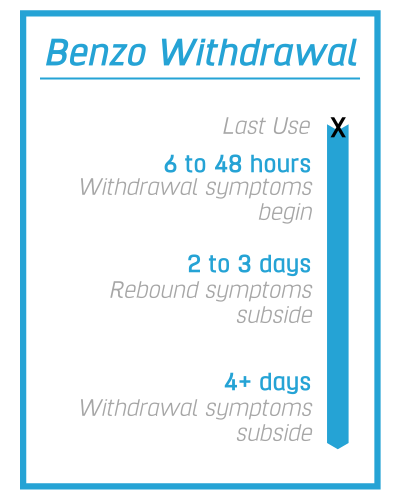
People recovering from abusing benzodiazepines seem to experience post-acute withdrawal syndrome most often and for the longest periods of time, often for years.
The exact cause or causes are not yet known, but they’re continuing to be investigated. Many scientists currently believe that the physical changes addiction causes in the brain, particularly the changes related to increasing a person’s tolerance to the drug, continue to cause withdrawal symptoms even after his or her recovery is complete.
PAWS Symptoms
In general, the symptoms of post-acute withdrawal syndrome are similar to the symptoms of anxiety and mood disorders. They may range from mild to severe in a single individual; they may also go away entirely for a period of time and then reappear. [3]
Some of the most common symptoms of post-acute withdrawal syndrome include:
- Problems with thinking (cognitive) tasks, such as problem-solving, learning, or memory recall
- Irritability
- Anxiety or panic
- Depression
Less often, a person may experience:
- Obsessive-compulsive behaviors
- Problems with social relationships
- Cravings for the addictive drug they used
- Pessimism or lack of interest (apathy)
- Sleep disturbances
- Increased sensitivity to stress
Stress can make any of these symptoms of post-acute withdrawal syndrome worse, but this can also happen without any apparent cause.
Is Inpatient Detox or Outpatient Detox Better for Me?
Patients or clients with high psychiatric severity and/or a poor social support system are predicted to have a better outcome in inpatient treatment, while patients with low psychiatric severity and/or a good social support system may do well as outpatients.
While each individual in treatment will have specific long- and short-term goals, all specialized substance abuse treatment programs have three similar generalized goals. [4]
- Reducing substance abuse or achieving a substance-free life
- Maximizing multiple aspects of life functioning
- Preventing or reducing the frequency and severity of relapse
Understanding the specialized substance abuse treatment system and Benzo detox, however, can be a challenging task. No single definition of treatment exists, and no standard terminology describes different dimensions and elements of treatment. Describing a facility as providing inpatient care or ambulatory services characterizes only one aspect (albeit an important one): the setting.
People experiencing severe symptoms of substance abuse, co-occurring mental health disorder, or previous complicated withdrawals and relapse may greatly benefit from various inpatient drug rehab center programs. Inpatient rehabilitation facilities provide individuals struggling with alcohol or drug abuse with a structured, stable, and secure environment void of all temptations and distractions to help clients focus solely on their recovery. This inpatient drug rehab center also provides 24/7 support and medical care to help mitigate any medical complications during their stay [5]. In addition, inpatient rehab centers provide clients with comprehensive medical detox, dual diagnosis treatment, various types of therapy, and counseling programs.
Inpatient drug rehab center programs usually begin with detoxification (detox) in a medically supervised detox program, such as Benzo detox. These provide professional support and medical monitoring while the client flushes harmful toxins from their body gained during substance abuse. Detox is the initial, physical part of treatment. Once this stage is complete, clients most often move to the next level of care [6].
Inpatient rehab center programs require clients to live onsite at the facility for the duration of treatment. Depending on the facility, the participant will be issued a bed in either a private or shared room for their stay. Each day, clients are required to attend counseling, therapy, classes, and different types of treatments every day for the majority of the day.

Programs, services, and treatments vary. We Level Up rehab center offers inpatient substance abuse treatment. Offering co-occurring treatments. We treat the entirety of addiction and behavioral health disorders including their secondary corresponding illnesses to improve long-term recovery outcomes. Get a free health assessment and find out what treatment options are most suitable for you. Call to learn more.
Benzo Detox Infographics
The infographic below illustrates the severity and potential fatality of benzodiazepine withdrawal, particularly without medical supervision. It also highlights the risk of developing Benzodiazepine Withdrawal Syndrome, which can lead to more painful effects on both the body and mind.
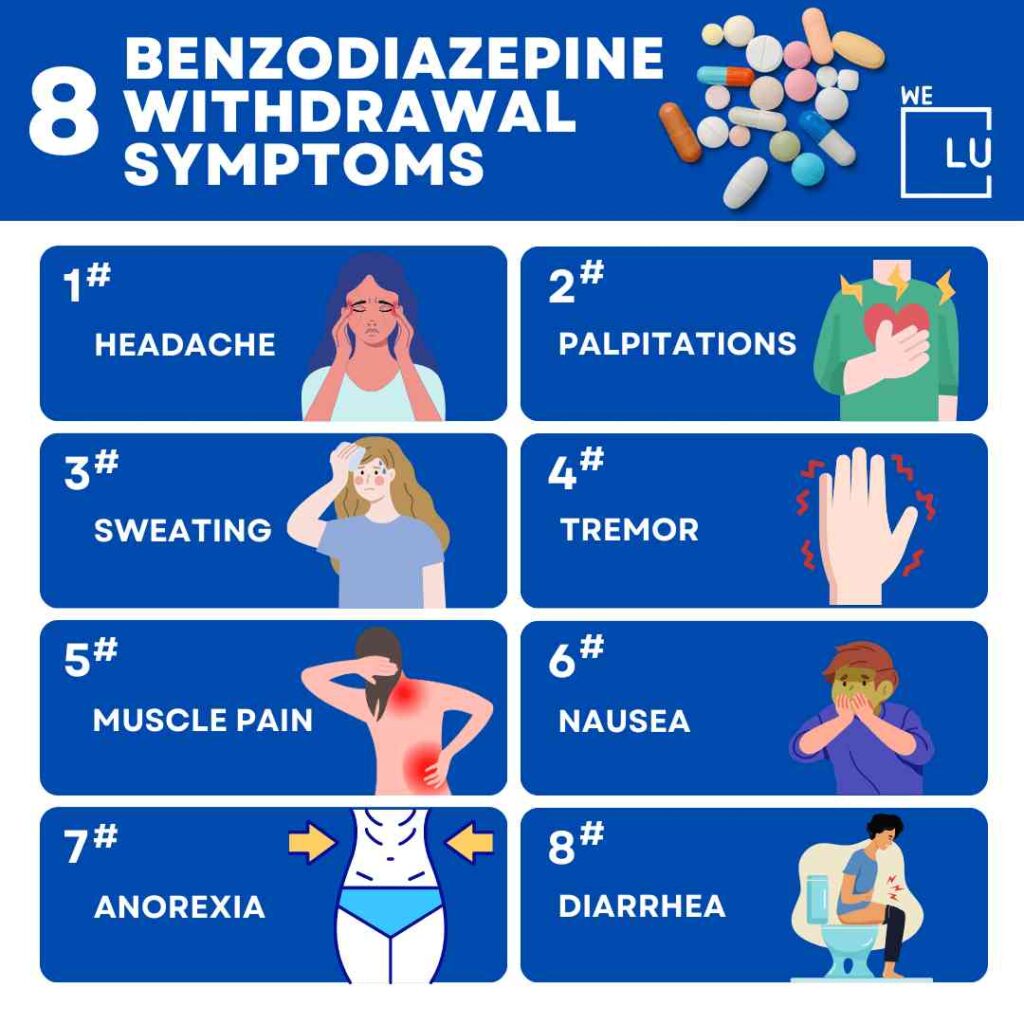
Embed the above “8 Benzodiazepine Withdrawal Symptoms” Infographic to your Website. This infographic is provided by the We Level Up Addiction Treatment Center team. To use the above infographics, you agree to link back and attribute its source and owner at https://weleveluptx.com/benzo-detox/
8 Benzodiazepine Withdrawal Symptoms image link: https://weleveluptx.com/wp-content/uploads/2024/02/8-Benzodiazepine-Withdrawal-Symptoms-1024×1024.jpg
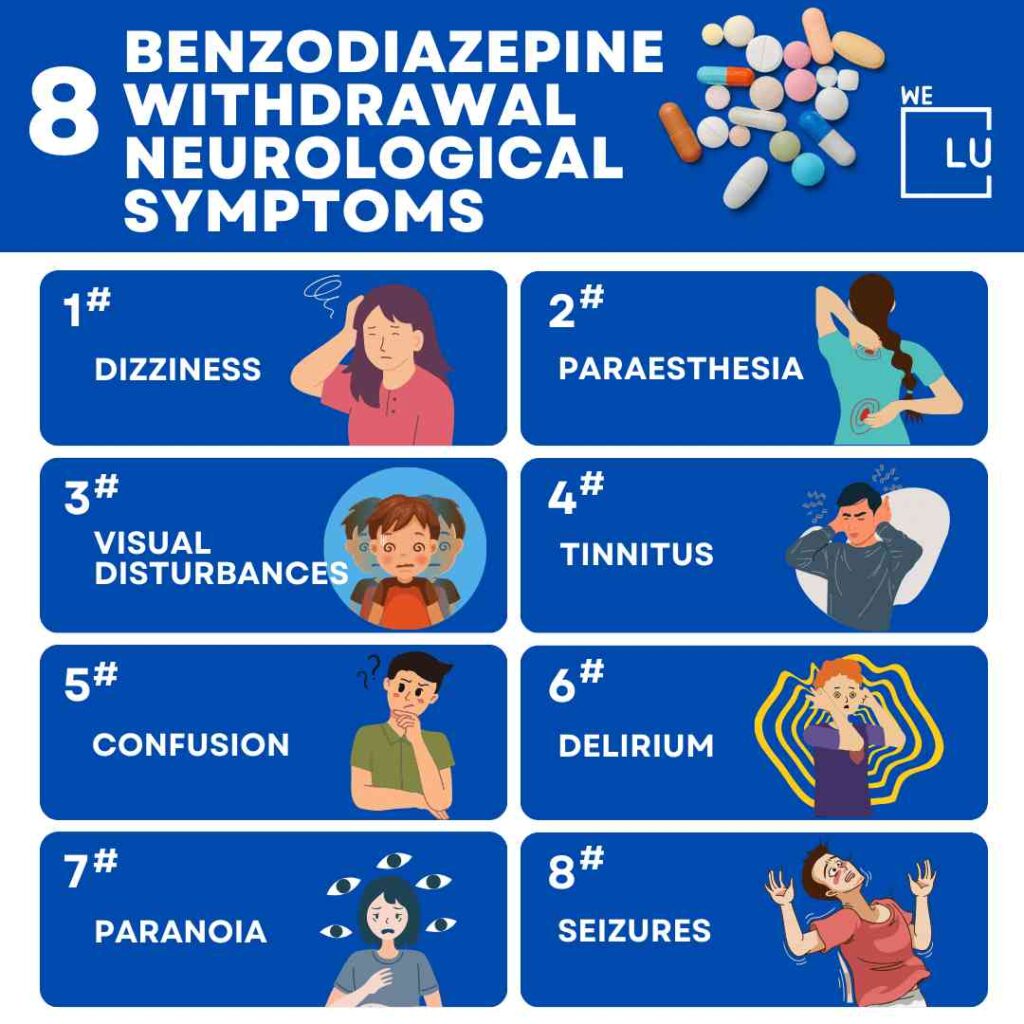
Embed the above “8 Benzodiazepine Withdrawal Neurological Symptoms” Infographic to your Website. This infographic is provided by the We Level Up Addiction Treatment Center team. To use the above infographics, you agree to link back and attribute its source and owner at https://weleveluptx.com/benzo-detox/
8 Benzodiazepine Withdrawal Neurological Symptoms image link: https://weleveluptx.com/wp-content/uploads/2024/02/8-Benzodiazepine-Withdrawal-Neurological-Symptoms-1024×1024.jpg
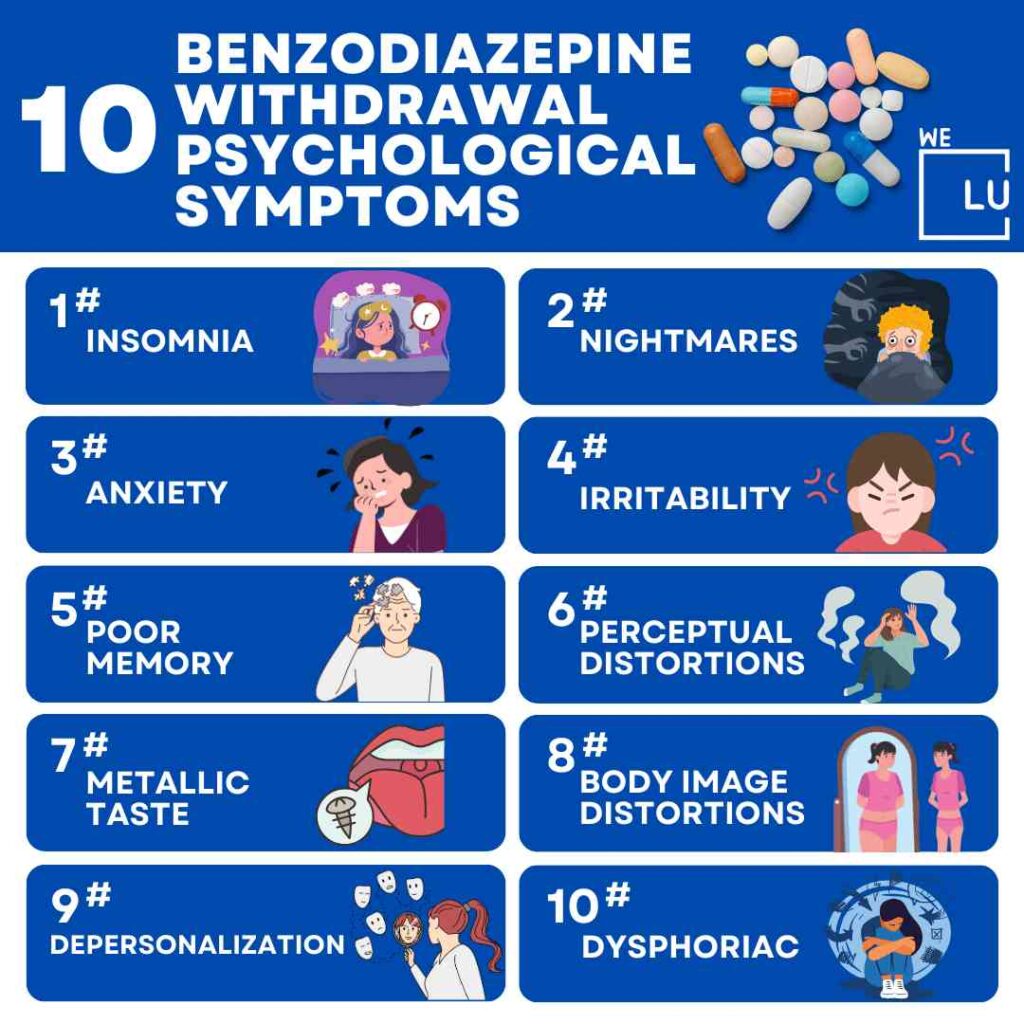
Embed the above “8 Benzodiazepine Withdrawal Psychological Symptoms” Infographic to your Website. This infographic is provided by the We Level Up Addiction Treatment Center team. To use the above infographics, you agree to link back and attribute its source and owner at https://weleveluptx.com/benzo-detox/
8 Benzodiazepine Withdrawal Psychological Symptoms image link: https://weleveluptx.com/wp-content/uploads/2024/02/8-Benzodiazepine-Withdrawal-Psychological-Symptoms-1024×1024.jpg
Treatment for Benzo Addiction
Benzodiazepine addiction can have social and psychological effects on those who struggle with it. Unfortunately, some may find these effects to be the most significant difficulty they encounter.
Often, benzo detox can lead to severe withdrawal symptoms. However, proper care and medical supervision will greatly reduce the chances of developing these symptoms and ensure a safe detox process. Typically, this means that the individual detoxing will be weaned off of the substance slowly and carefully. Depending on their biology, dosage, and frequency of use, the time it takes to taper off varies but is usually achieved within a few weeks.
Benzo detox also brings on rebound symptoms. Rebound symptoms are the return of symptoms that may have been present at the start of taking the medication and the symptoms may be heightened for a few days. This includes insomnia, anxiety, and unexpected stress. As the body adjusts through the Benzo detox process, these symptoms will subside.
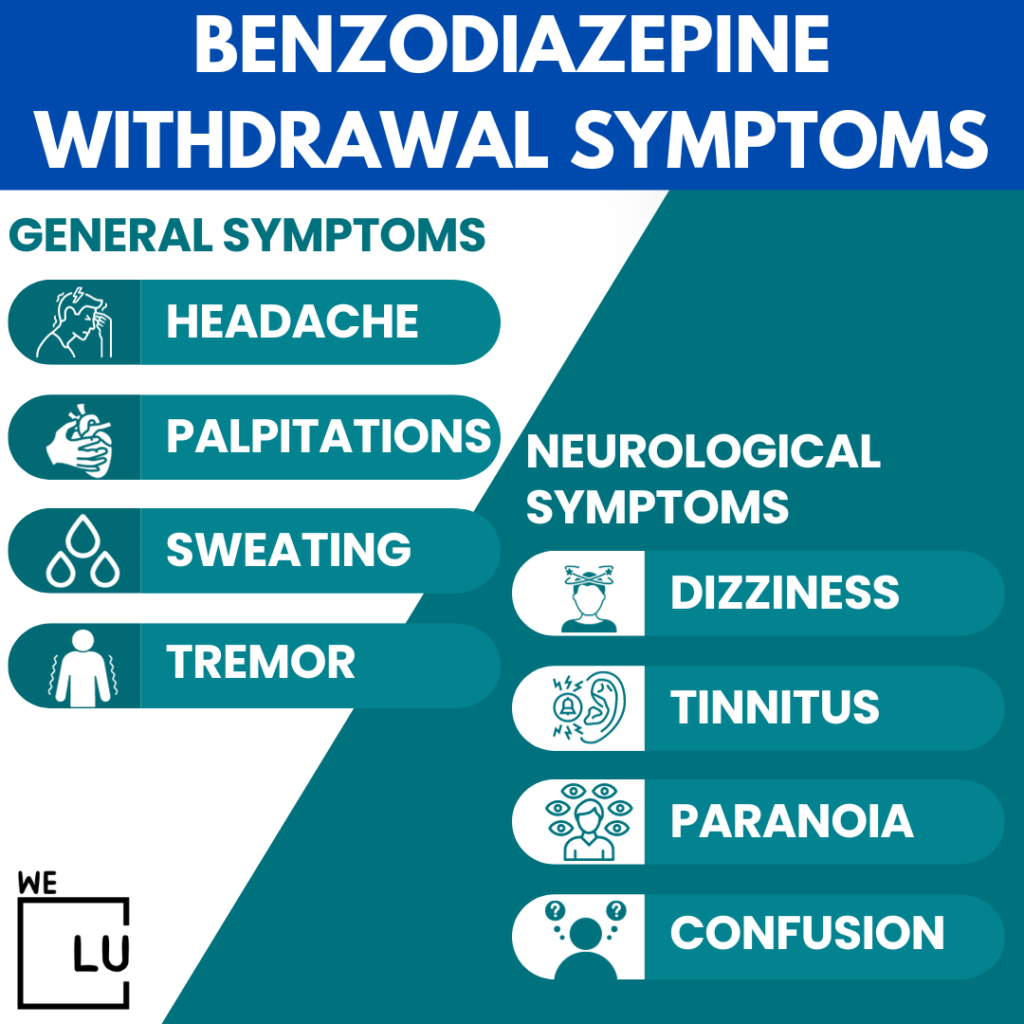
Our facilities are fully equipped and ready to provide top-quality state-of-the-art service and care to each and every individual who reaches out to us suffering from a benzodiazepine addiction or dependence.
We Level Up Tx employs trained and experienced professionals in benzo detox protocol and procedures.
Get started on the road to recovery today; you’re just a phone call away!
Sources:
[1] Management of Benzodiazepine Misuse and Dependence – National Center for Biotechnology Information
[2] We Level Up https://welevelup.com/addiction/benzo-addiction/
Benzo Addiction Addiction – CBT Therapy For Addiction – We Level Up FL Dual-Diagnosis Center
[3] https://www.verywellmind.com/what-to-do-for-post-acute-withdrawal-syndrome-paws-22368
[4] Specialized Substance Abuse Treatment Programs – National Center for Biotechnology Information
[5] NIDA – https://www.drugabuse.gov/publications/drugfacts/treatment-approaches-drug-addiction
[6] NIDA – https://www.drugabuse.gov/publications/principles-drug-addiction-treatment-research-based-guide-third-edition/drug-addiction-treatment-in-united-states/types-treatment-programs